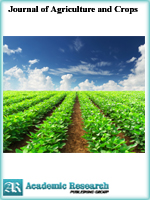Journal of Agriculture and Crops
Online ISSN: 2412-6381
Print ISSN: 2413-886X
Print ISSN: 2413-886X
Quarterly Published (4 Issues Per Year)

Archives
Volume 6 Number 3 March 2020
Influence of Mannitol Priming on Maize Seeds Under Induced Water Stress
Authors: P. Dhakal ; R. Subedi
Pages: 27-31
DOI: doi.org/10.32861/jac.63.27.31
Abstract
Drought stress is seen as the major abiotic stress in the modern day agriculture and hinders crop germination and seedling establishment and maize suffers the problem more as a summer season crop. Priming is a physiological method to overcome such deleterious effect of water stress with the main aim of increasing the germination of seed. A lab experiment was therefore performed with maize seed priming using Mannitol @ 0%, 2%, 4%, 6% and 8% (w/v) concentrations subjected to germination under induced drought of 0 Mpa, 0.15 Mpa, 0.5 MPa, 1.0 MPa and 1.7 MPa using NaCl. The experiment was laid in completely randomized design (CRD) with three replications. Priming with mannitol reduced the Mean Germination Time (MGT); the best result obtained in seeds primed with 2% mannitol. However, the final germination count, Relative Water Content (RWC) and root and shoot length remained unaltered. Germination activities reduced with increasing moisture stress. The study indicated that priming with mannitol could improve the speed of germination in maize seeds.
Influence of Selected Institutional and Technological Factors on the Adoption of Sustainable Agriculture Technologies in Maize Farming in Mzimba South, Malawi
Authors: Owen Austin Banda ; Maurice Ongalo Udoto ; Joel Kipkemoi Ng’eno
Pages: 16-26
DOI: doi.org/10.32861/jac.63.16.26
Abstract
Sustainable Agriculture Technologies (SATs) significantly contribute to addressing the negative effects of land degradation, poor soil health and climate variability in the agriculture sector. Despite efforts made by different stakeholders in promoting SATs to improve maize productivity in Mzimba South in Malawi, the adoption of the technologies among small-scale farmers remains unsatisfactory. As a result, most of the farmers continue to realize low maize yields. A survey was conducted from July to September 2019 to investigate the influence of selected institutional and technological factors on the adoption of SATs in maize farming among the small-scale farmers in Mzimba South. A multi-stage sampling procedure was used to select a representative sample of 132 small-scale maize farming household heads. Data was collected using a researcher-administered questionnaire. Multivariate probit, ordered probit and ordinary least square (OLS) models were applied to determine the influence of the selected factors on the adoption of SATs at α level of .05 using STATA and SPSS. Qualitative data was analyzed by a deductive approach, in which responses were categorized and summarized under the related themes. The study established that the adoption of SATs was significantly influenced by membership in farmer organizations (FOs), access to extension services, and the levels of relative advantage and complexity associated with the SATs. The findings of the study implied that the Government of Malawi and relevant stakeholders in the agriculture sector need to train and recruit more extension field staff to improve coverage and frequency of extension services delivery on sustainable agriculture. The stakeholders should also promote affiliation of the small-scale farmers to FOs to improve access to agricultural extension services and production resources on sustainable farming. In addition, efforts should be made to develop and promote affordable mechanization options for reducing farm drudgery associated with the implementation of SATs. Furthermore, the Government of Malawi should facilitate the formulation, enactment, and enforcement of local by-laws for safeguarding the SATs and their related inputs (or raw materials) against vandalism, livestock damage, and bushfires.



